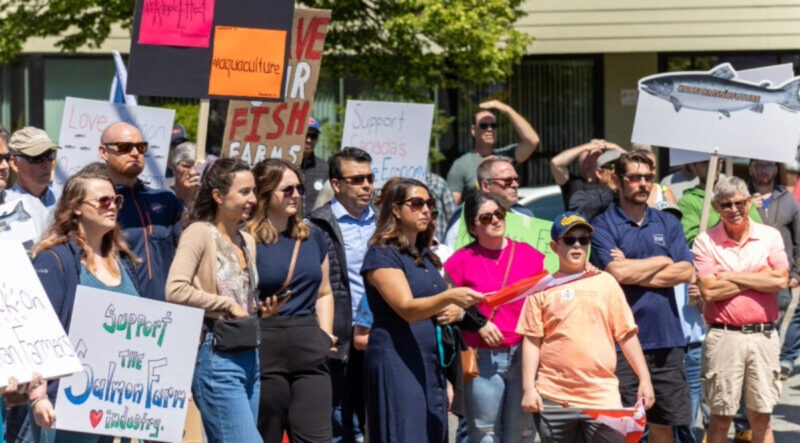Aquaculture: “Our people need hope for the future”
Aquaculture supply and support companies, which sustain the livelihoods of thousands of British Columbians, call for six-year salmon farm licence renewals.
By Fabian Dawson
SeaWestNews
Aquaculture support companies, which directly employ hundreds of British Columbians while sustaining the livelihoods of thousands of others in the sector, are calling on Ottawa to renew the licences of salmon farms on Canada’s west coast for a minimum of six years.
“Our people need hope for the future, and certainty that they will be able to provide for their families tomorrow,” said the companies, in a letter sent yesterday to Prime Minister Justin Trudeau.
The letter, signed by representatives of two dozen companies, ranging from boat operators to trucking companies, feed producers and aqua-tech providers adds to a growing chorus of support for the aquaculture sector in BC.
It comes as the Federal government considers renewing the soon-to-expire salmon farming licenses, pending the formulation of a Transition Plan for the sector in the province.
The Liberal government, at the behest of activists, has already shut down 40% of salmon farms since 2020, increasing carbon emissions and wiping out jobs that are the lifeblood of rural, coastal and Indigenous communities.
Before the shutdowns the salmon farming sector was the largest agri-food export in British Columbia. The sector employed approximately 6,500 people, produced close to 500 million salmon meals per year, received inputs from over 1,000 individual suppliers and had an economic value of $2 Billion.
Today, 100 per cent of BC’s farmed salmon is raised in agreement with Rights Holder First Nations. The partnerships directly and indirectly employ over 700 Indigenous people and provides $120 million in total annual direct and indirect economic benefits to First Nations, with $42 million going directly to Indigenous communities.
Taken as a whole, the entire sector now generates over $1.142 billion of direct economic activity in BC annually supporting approximately 6,000 direct and indirect jobs.
The activists have recently ratcheted up their campaign to remove salmon farms in BC fearing that the current Fisheries Minister Diane Lebouthillier, unlike her activist-friendly predecessor, will opt to let science instead of their fearmongering dictate the future of marine aquaculture in the province.
The Coalition of First Nations for Finfish Stewardship, which is fighting to retain traditional rights to farm fish, has also called for a six-year licence reissuance for the salmon farms in the territories of its member nations, pending the transition process.
The coalition said the activists are spouting “misinformation about salmon farming in our territories and attempting to erase the sovereign rights and title of over a dozen coastal Nations in B.C. to suit an activist-driven agenda based on activist science.”
It recently released a comprehensive report, to reinforce the socio-economic importance of the sector and stressed that the future of salmon farming in BC must be determined by First Nations who want to farm fish in their traditional territories.
The ‘scientific textbook’ called Modern Salmon Farming in British Columbia: A Review, is also aimed at closing the knowledge gaps about the industry and counter the campaign of disinformation by anti-salmon farming opponents.
The Canadian Aquaculture Industry Alliance and the Canadian Federation of Agriculture have also called on the Trudeau government to issue six-year extensions of the expiring salmon farming licences.
“Six-year licenses – a single cycle for planning and production – is the minimum signal needed to ensure the sustainability of these farms, and the only path to hundreds of millions of dollars in investment in the badly hurting BC economy,” they said in their open letter to Trudeau, sent earlier this year.
Below is an excerpt of the letter sent yesterday to Trudeau by the aquaculture supply and support companies;
“As businesses engaged in the British Columbia Salmon Farming Sector, we directly employ many hundreds of British Columbians, and indirectly support thousands more.
Those within this food production sector are unable to plan for the future of their families, not knowing if their jobs will exist in the months and years ahead. This is an unjust and unfair situation for the hard-working people of this province.
Additionally, the private sector is limited in its ability to invest further in the face of this continued uncertainty.
As a sector, we have shown our commitment to sustainability and environmental stewardship. We plan to accelerate this trajectory to become world leaders over the next decade, if given the opportunity.
The future that all parties want includes the most progressive and ethical methods of salmon farming. But it’s a future that requires hard work and investment, resources that require a long-term outlook to succeed.
Overall, we know that a “Responsible BC Salmon Farming” transition pathway is within our reach.
This path can and must support enhanced wild salmon protection, further Indigenous
reconciliation, continued innovation, the highest quality home-grown food production, and additional job creation across our province.
To get there, we need you to provide the certainty needed for further private sector investment.”
(File Image – Hundreds of aquaculture workers turned out at a rally to save their jobs in Campbell River on June 1, 2023)

